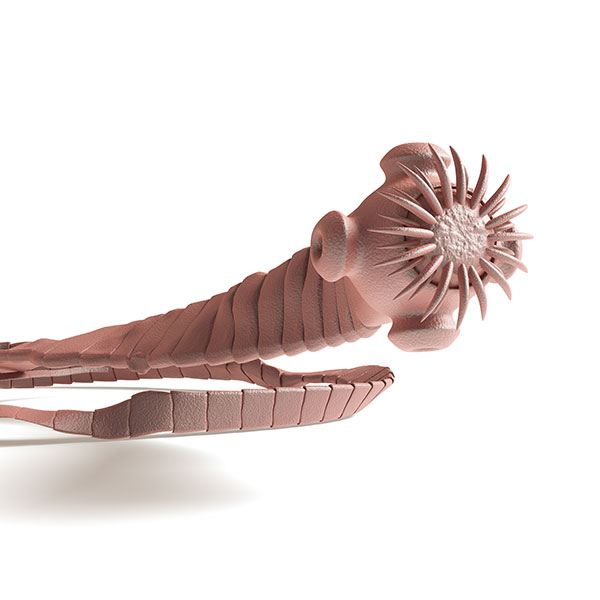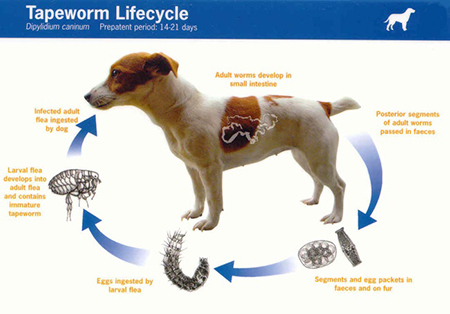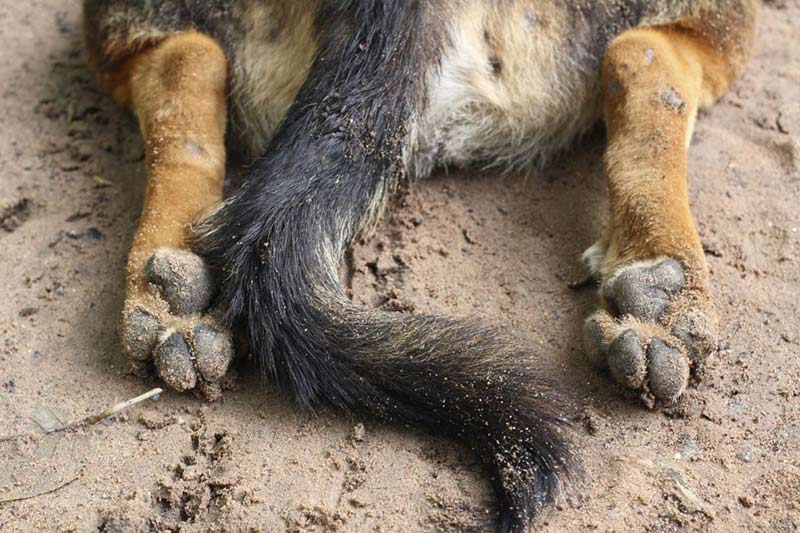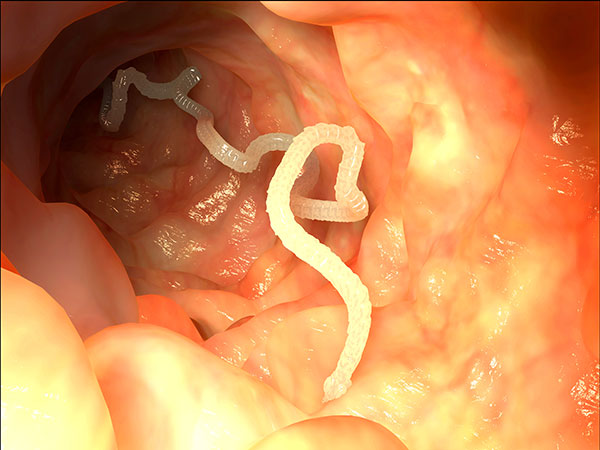How to Get Rid of Tapeworms in Dogs
What are Tapeworms?
Tapeworms are an intestinal parasite. Along with roundworm, hookworm, and whipworm, this flat, segmented worm is found in dogs, cats, humans, and many other species around the world. The most common tapeworm species isDipylidium Caninum. The medical term for a tapeworm infestation isCestodiasis.
If you've ever seen photos of tapeworms, your reaction was probably one of automatic revulsion. (Especially those alarming videos of tapeworms being removed from people. A woman in China had an eight-foot tapeworm taken out of her stomach!) Even though they're disgusting to look at, it's important to recognize the signs of parasites, so your dog can be treated before the worms do damage to his body. The good news is that treatment for tapeworms is very effective and simple.

A medical model of an adult tapeworm /Copyright decade3rd-anatomy online
How Do Dogs Get Tapeworms?
There is a cycle through which dogs get tapeworms:
- First, the dog will ingest a host that is harboring tapeworm eggs, most often an adult flea. There are a few ways a dog might ingest a flea, such as self-grooming, or grooming a canine or feline housemate. Other animals that are potential transmitters of eggs include birds, rabbits, or rodents, which even a well-fed dog might scavenge for.
- Once digested, the tapeworm eggs settle into your dog's small intestine. There it will develop into an adult.
- The adult tapeworm is made up of lots of small segments, each about the size of a grain of rice, called proglottids. Adult tapeworms usually measure anywhere from four to 28 inches in length.
- As the tapeworm matures inside the dog's gut, these segments break off and end up in the dog's stool. Since these segments contain tapeworm eggs, the cycle will begin again, with a new host and most likely a new recipient.

Courtesy ProLabs
How to Tell if Your Dog Has Tapeworms
The Centers for Disease Control and Prevention (CDC) says the proglottid segments can sometimes be seen crawling near the anus or on the surface of fresh waste. These eggs are released into the environment when the proglottid dries out. The dried proglottids can sometimes be seen stuck to your dog's fur.
Another telltale sign of worm infestation is if your dog scoots his anus across the ground, on a rug, or another rough surface. This is due to the irritation the segments are causing his skin. You may see your dog licking or biting at the area. Occasionally, a portion of the tapeworm will be released when your dog vomits.
Tapeworms are not usually harmful, and dogs rarely become ill as a result of an infestation, but weight loss may occur if he is heavily infected.

Diagnosis and Treatment of Tapeworms in Dogs
Have you ever wondered why your veterinarian asks you to do the unpleasant task of collecting and bringing in a fecal sample for an annual physical? The answer is: that's how he tests for worms. The test will find out if tapeworms are in the anal sac or in the feces of your dog. False negatives can occur, but the tapeworm test is reliable, and most results are conclusive. The prognosis for both animals and humans is very good post-treatment.
A prescription drug called praziquantel is used to treat tapeworms, either orally or by injection. The medication causes the tapeworm to dissolve within the intestine. The drug generally does not have adverse side effects.
Other medications that are effective at removing tapeworms include chewables, granuals that are sprinkled on food, and tablets. There are also combination parasite medications that treat tapeworm, hookworm, roundworm, and whipworm in one.
PetMD points out that it's important to administer all of the prescribed medication to ensure that the tapeworms are completely gone from your dog's body. And before using any over-the-counter medication on your own, consult with your veterinarian for proper diagnosis and treatment options.

Tapeworm inside dog intestine / Copyright Juan Gaertner
Can Tapeworms Be Passed Along to Humans?
Tapeworms can be transmitted to humans, but the risk of infestation is very low—you'd have to swallow an infected flea or, in the case of some species of parasites, via the accidental ingestion of feces that is carrying parasitic eggs. Children are most prone to this, since they're more likely to be outside playing in grass, parks, and other areas where dog waste might be left.
Prevention of Tapeworms in Dogs
The best way to avoid a tapeworm infestation is to keep your dog free of flea infestation. The surrounding environment must also be treated to prevent recurring infestations. The CDC recommends these steps to reduce the likelihood of tapeworm infestation:
- Control fleas on your pet, and in their indoor and outdoor environments.
- Have your veterinarian treat your pets promptly if they have tapeworms.
- Clean up after your pet, especially in playgrounds and public parks. Bury the feces, or place it in a plastic bag and dispose of it in the trash.
- Do not allow children to play in areas that are soiled with pet- or other animal feces.
- Teach children to always wash their hands after playing with dogs and cats, and after playing outdoors.
- Keep the dog away from dead animals and garbage.
Note: This article is designed to help inform you about tapeworms in dogs and is not meant to take the place of a veterinary diagnosis or consultation. If you think your dog might have tapeworms or any parasite, contact your vet right away to set up an appointment for an examination and to ensure that your dog receives the safest and most effective treatment.
Sources: The Centers for Disease Control and Prevention, PetMD, The Merck Veterinary Manual
How to Get Rid of Tapeworms in Dogs
Source: https://www.akc.org/expert-advice/health/tapeworms-in-dogs-symptoms-treatment-and-prevention/